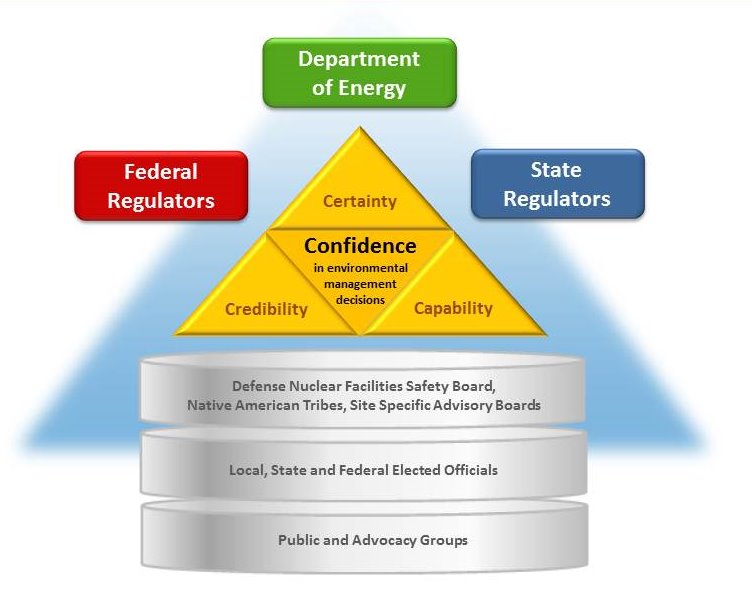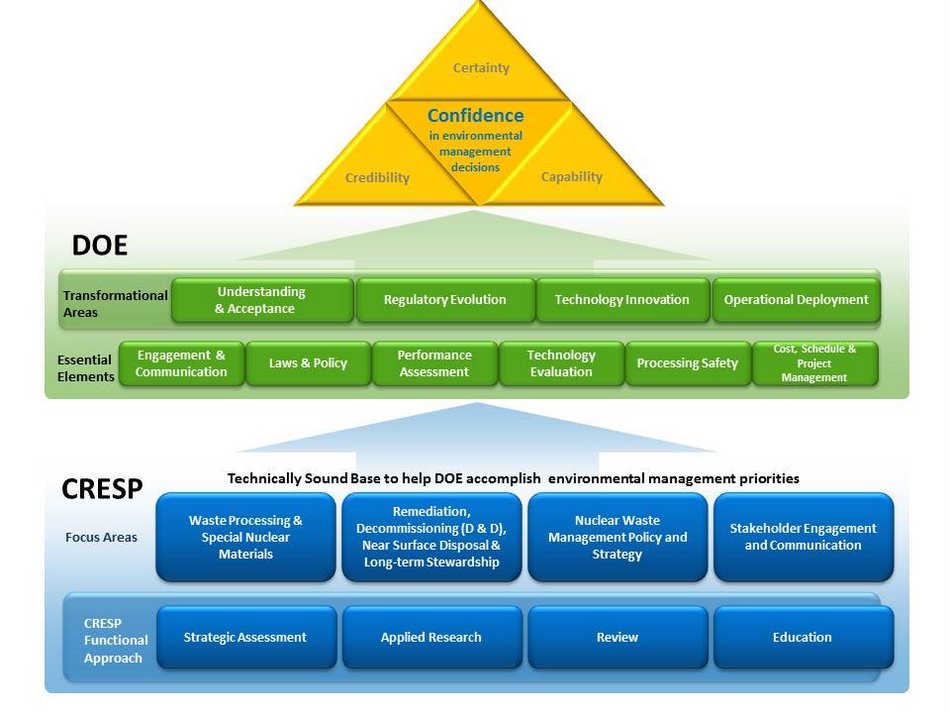Engaging and fostering stakeholder participation to help DOE-EM effectively execute its missions
One of the nation’s leading interdisciplinary research groups focused on managing nuclear waste and environmental legacies
Approach
The Consortium for Risk Evaluation with Stakeholder Participation (CRESP) is one of the nation’s leading independent, interdisciplinary research groups focused on managing the waste management and environmental legacy from production of defense nuclear materials and nuclear energy. CRESP has been supported by the Department of Energy Office of Environmental Management (DOE-EM) through a cooperative agreement since 1995. Vanderbilt is leading this multi-university consortium of engineers, scientists, and legal and policy experts who have contributed over the past 29 years to the progress being made in addressing the nation’s largest environmental liability.
Mission
The CRESP mission is to advance cost-effective and risk-informed environmental cleanup of the nation’s nuclear weapons production facility waste sites. We accomplish this by looking for ways to improve the scientific and technical basis for environmental management decisions while fostering public participation and engaging stakeholders.
CRESP provides support to DOE primarily in the following focus areas:
- Waste Processing and Special Nuclear Materials
- Remediation, Near Surface Disposal and Long-Term Stewardship
- Nuclear Waste Management Policy and Strategy
- Stakeholder Engagement and Communications
CRESP Approach
CRESP’s mission is pursued through four types of activities or approaches:
- multi-disciplinary strategic analysis
- applied research
- independent expert review
- education
As each activity is carried out, CRESP strives to engage in and foster the participation of the full range of stakeholders to help DOE effectively execute its ongoing missions related to remediation, storage, treatment, and disposal of waste from former and any current defense and civilian nuclear activities.
Multi-disciplinary Strategic Analysis
Integrated, cross-cutting analysis and engagement with a full range of stakeholders.
CRESP provides multi-disciplinary assessment of strategic nuclear waste management issues and initiatives that are carried out by CRESP senior researchers who are typically working with one another as well as established national and international leaders. These analyses are intended to identify information gaps and evaluate alternative pathways to help DOE progress.
Applied Research
Focused university-led research projects involving graduate and post-doctoral students.
CRESP conducts applied research through a carefully-selected portfolio of projects designed to address critical knowledge gaps in specific focal areas. Individual research projects are linked with DOE programmatic or site-specific needs and are carried out in conjunction with graduate and post-graduate education. CRESP also embraces a stakeholder-involved research model. That means relevant stakeholders are involved as much as possible in defining the problem and research objectives as well as providing insight on findings at key milestones.
Independent Expert Review
Independent multi-disciplinary peer reviews of key DOE documents, other projects and reports.
CRESP provides several types of independent multi-disciplinary expert reviews of:
- DOE documents, including draft regulatory documents
- Other projects and reports
- Specific technical challenges faced by EM managers
Typically CRESP organizes these reviews, but CRESP-supported researchers also participate in review mechanisms and tasks when their participation, and CRESP-support of their review work, is identified. CRESP reviews have often shaped major nuclear waste decisions such as specific restoration options, performance assessments, and environmental impact statements.
Education
Ongoing training, career programs, and workshops for continuing professional education as well as undergraduate and graduate student education
The educational function of CRESP is ongoing and multi-dimensional in that it:
- Provides a multi-disciplinary foundation for the next generation of professionals in nuclear waste management through graduate and post-graduate training
- Develops materials, frames degree programs, and carries out workshops for those currently working in waste management to facilitate professional development
CRESP Overview
This overview graphic illustrates the relationship between environmental management decisions, DOE priorities, CRESP work, and the stakeholders both organizations must satisfy. It also illustrates how CRESP interacts with the DOE.
Through its functional approach and focus areas, CRESP provides a technically sound base to help DOE accomplish its environmental management priorities.
Important Factors that Contribute to Environmental Management Decisions
Since the mid-1990s, the CRESP consortium has helped identify and address the many factors needed by the DOE-EM to succeed in its “journey to excellence.” This includes using CRESP’s multi-disciplinary approach to add credibility and help build confidence in EM decision making, which EM leadership along with regulators, affected tribes and other stakeholders have recognized as vital due to the inherent complexity and uncertainty of EM’s legacy waste management tasks. See the list of DOE Sites that CRESP has done work over the course of nearly 25 years.

